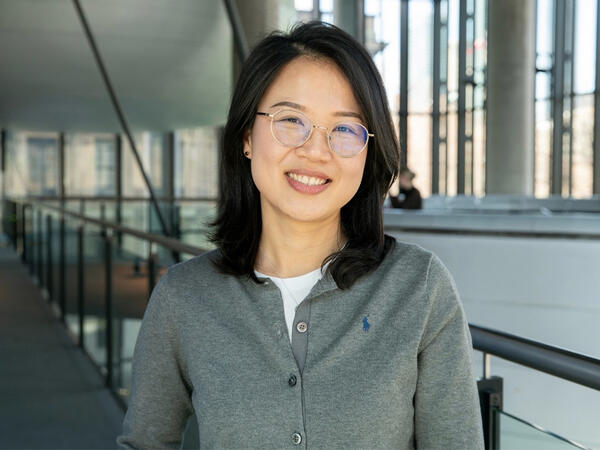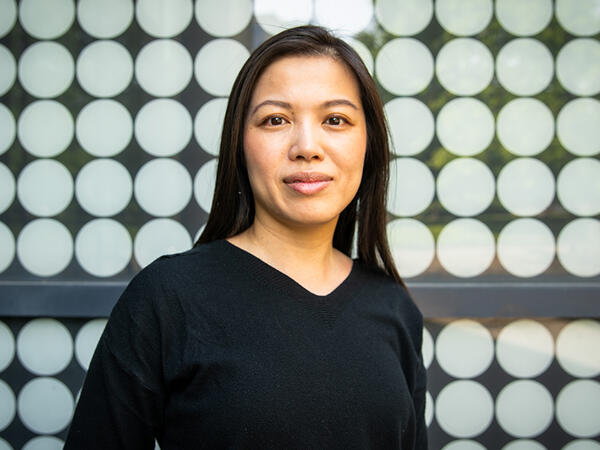Chukwunonso Nwabufo plans to use academic and industry backgrounds to conduct translational research
Chukwunonso Nwabufo, a new PhD student at U of T’s Leslie Dan Faculty of Pharmacy, plans to use his education and experience in industry to help move novel discoveries from bench to bedside. He says the Faculty’s proximity to clinical and industry leaders will help to foster the translational research that he aims to do.
“The University of Toronto is one of the best in the world, and the Leslie Dan Faculty of Pharmacy is strategically located at one of the most vibrant research community in North America, creating opportunities for multidisciplinary research,” Nwabufo says. “Being in that environment will be a good way to do the benchwork but also collaborate with other scientists and move my research to the bedside.”
Nwabufo earned a Bachelor of Science in biochemistry at the University of Benin in Nigeria, where he was born and raised. He was interested in drug discovery and development and decided to pursue a master’s degree at the University of Saskatchewan’s College of Pharmacy and Nutrition. His research was focused on Parkinson’s disease – a neurodegenerative disorder that has no cure or definitive diagnostic test. He performed preclinical studies on three novel compounds that are in development as potential therapeutics or diagnostics for Parkinson’s disease.
Industry work contributes to approval of remdesivir for treating severe COVID-19
Two years ago, as his master’s degree was finishing, he accepted a role as senior research associate at Gilead Sciences and moved from Saskatoon to Edmonton. In his role at Gilead, he has been supporting preclinical and clinical drug development programs and contributed to the successful approval of remdesivir with conditions for the treatment of severe COVID-19, as well as the development of a long-acting antiretroviral drug for HIV.
But Nwabufo always knew he wanted to continue graduate studies and gain experience in discovering and developing drugs for life-threatening diseases. He was accepted as a PhD student in the pharmaceutical sciences program at the Leslie Dan Faculty of Pharmacy, and this fall he will be joining Reina Bendayan’s team. Bendayan’s research focuses on uncovering the role of drug metabolizing enzymes and membrane-associated drug transporters in limiting the clinical efficacy and safety profile of drugs.
“Although drug repurposing is efficient, economical and less risky compared to the traditional drug discover approach, failure is inevitable if drug developers neglect intrinsic factors, including drug metabolizing enzymes and membrane-associated drug transporters liabilities,” says Nwabufo. “My primary goal will be to improve the success of drug development programs by providing strategies for addressing intrinsic liabilities before entering clinical studies.”
National op-ed highlights solutions to current barriers in Canadian drug development
Nwabufo recently arrived from Edmonton, and he is looking forward to reconnecting with old friends and living in a big city again. He has also been accepted as a junior fellow at Massey College, which provides opportunities to attend lecture series and network with prominent academics and professionals, and he is excited to become a part of that community.
During the pandemic, Nwabufo became interested in how challenges in Canada’s pharmaceutical sector may limit translational research and drug development and was determined to share solutions with policymakers to address this problem. He wrote an op-ed published in the Hill Times in early June that recommended ways that academia, industry, and government could work together to advance drug development in Canada and improve drug access, including providing more funding for scientific research and fostering collaborations. He brings this perspective to his own research.
“I’m a changemaker, and I would like to see things change for good in our society,” he says. “I hope that because of the translational aspect of my research, there will be ways in which we can collaborate with industry and translate some of these discoveries to ultimately benefit patients.”
By Eileen Hoftyzer
More News
Image

Grad to Watch: Jackie Fule Liu’s research focuses on better outcomes for diabetes patients
A recent PhD graduate, Jackie Fule Liu combines hands-on skill and big-picture thinking to help tackle diabetes care challenges.
Read More
Image

U of T community members recognized with Order of Canada
Congratulations to Dean Emeritus and Professor K. Wayne Hindmarsh on his appointment.
Read More
Image

Welcoming Ivy Lam as Academic Lead in Climate, Health & Sustainable Care
Assistant Professor Lam will guide the Leslie Dan Faculty of Pharmacy's efforts to embed environmental sustainability across the Faculty.
Read More
